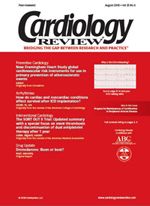The ABC: A community of leaders promoting health and disease prevention
One of the ABC’s most cherished activities is honoring the achievements of physicians, researchers, and scientists. The recipient of the 2006 Pioneer in Cardiology Award for Out­standing Achievement in Cardiovascular Medicine is the Dean of Admissions at Duke University School of Medicine, Brenda Armstrong, MD. Dr Armstrong has ensured that each class has no less than one quarter of high-achieving minority students. In addition, she performs bench research, teaches, mentors, and practices clinical medicine, as well as being a mother and community leader.
Recent attention to the life and times of Rosa Parks allows us to reflect on the dramatic progress made by African Americans since the Civil Rights Move­ment launched with the Montgomery Bus Boycott in 1955. Over the ensuing 50 years, African Americans have risen to positions of prominence in all aspects of human endeavor: government, judicial, business, sports, religion, and academic life have all been favorably influenced by the fall of segregation and the strides toward integration. Many myths— some malicious, but most born out of ignorance, either by lack of exposure or by lack of access—have been overcome in the process. Health has undoubtedly occupied its fair share of activity during this time. Despite the tumbling of the walls that separate the races, there is still a significant difference in the length and quality of life here in America that can be predicted by race. The 10-year spread in survival be­tween black and white men and women can mean the difference between drawing Social Security or not, knowing one’s grandchildren or not, or being able to meaningfully share one’s lifetime of experiences.
Since the founding of the ABC, the rate of cardiovascular disease mortality has been cut by half. At a time when the dictum stated that African Americans were not susceptible to cardiovascular disease, the founding members gathered to shed light on the consequences of cardiovascular disease on the black community.
The founding of the ABC in 1974 marked the first conference on disparities in cardiovascular health. We now fully appreciate the excess mortality caused by cardiovascular disease in our community. This realization was de­scribed through the efforts of ABC members. When the nuances of the African American cardiovascular system came into question, ABC members led the way by conducting seminal cardiovascular clinical trials in African Americans. ABC members pioneered the organization of churches, barbershops, and beauty salons as health promotion centers in the African American community. When the myth of African American unresponsiveness to neurohormonal modulation arose, it was ABC members who demonstrated and educated the medical community on the appropriate use of this life-saving therapeutic arm in African Americans.
Likewise, ABC members were in the vanguard of realizing the relative contribution of hypertension, as opposed to coronary disease, as the predominant factor in heart failure among Afri­can Americans. Most recently, it was our members who elucidated the benefit of specific drugs targeting African Ameri­cans with heart failure, once again shattering a popular myth that large-scale randomized clinical trials could not be successfully performed in an African American cohort. This led to the FDA approving a race-specific drug for the first time in its 100 years of existence. Wherever there is concern about African Americans and their cardiovascular health, our members are often the first to respond. This is the “Community of Leaders” that ABC promulgates.
Whether responding to the pressing health manpower crisis, investigating genetic markers of cardiovascular disease, elucidating pay-for-performance inequities, or defining differential treatment responses, our members have been at the forefront. It is the individual members of the ABC who make a difference in their communities, the nation, and, in fact, the world.
By raising our issues, we promote awareness, scrutiny, evaluation, and edu­cation. Leaders from our ranks, Drs Edward Cooper and Augustus Grant, have served as Presidents of the Ameri­can Heart Association. Dr Kim Williams served as President of the American Society of Nuclear Cardiology. Dr Charles Francis was President of the American College of Physicians. Dr Roderic Pettigrew served as the first Director of the National Institutes of Health’s National Institute for Biomedical Imaging and Bioengineering. The list goes on!
However, it is our many members who are active on their local hospital committees and community boards that provide our power. The membership targets the impact; the association supplies the force. All who have had contact with the ABC respect the dedication, intellect, and candor we possess. Our volunteerism and commitment to excellence is unsurpassed.
We congratulate Drs Paul Douglass and Kim Williams as they rise within the leadership of the American College of Cardiology; we take pride not only in their individual achievements but in the achievements of every member of our association. To paraphrase the noted an­thro­pologist Margaret Meade, “It only takes a few committed people to change the world.” There is no more fulfilling experience than to serve as president of this great association. We must vigorously pursue our mission for health equality with the same enthusiasm engendered by our pursuit of civil rights during the Montgomery Bus Boycott. The world is about change!
